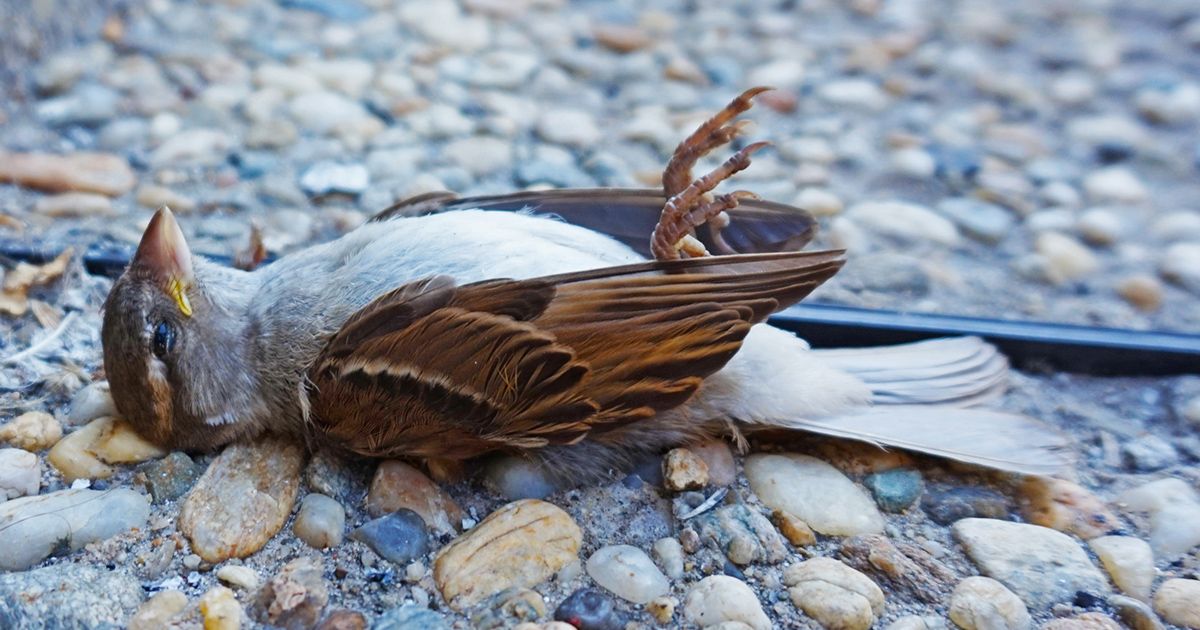DEAD FLOWERS AND A CRYING ISLAND
★ ★ ★ ★
FICTION

By Thadd Simpson
In the center of the living room window, Miller Antilles noticed a small crack twisted into the glass. Still clinging to granular lacerations were three faint, downy feathers. It was only moments ago while he’d been shuffling about the kitchen—indecisively fluttering between the coffeepot, refrigerator, and second-left cabinet—that he was startled by a loud THUD from the other room. It had been three minutes since that first noise, and two since he’d peeped around the corner and peered into his living room. There were marks on the carpet where the chairs and couch had been days before. Only the coffee-table and TV, his coffee-table and TV, remained. Well, them and the feathers on the window.
It was a cool, summer Sunday with a vigorous breeze in the air. The Midwest had only ever felt cold to Miller, even when it was warm. He stood outside on the cement sidewalk that hugged his small home, hands at his sides, and stared down at the little, dead bird. It was a small, blue and gray-colored thing with a white belly. The down matched that stuck to the window.
Back inside, Miller decided to forgo any breakfast at all; feeling he didn’t deserve any. In the master bedroom, he walked over the yellow flower petals on the hardwood floor to get to his dresser. The image of that bird dead on the sidewalk made him cringe and shake his head. Miller found an old pair of off-white jean shorts with rolled cuffs, and pulled a dark polo shirt out of his closet. The clothes didn’t feel right, like he was wearing plain gray cloth without any sense of purpose or identity. They didn’t feel like his clothes.
By compulsion, he checked his phone. His home screen was barren. No new notifications, no missed calls, nothing on Instagram. The absence was painful, even isolating. He looked around, saw the bed he hadn’t made in a month, a digital alarm clock that had been wrong since daylight-savings time, and underfoot, a hundred dusty little yellow petal reminders.
Miller shut the garage door and walked to his car, a canvas bag hanging in the crook of his arm filled with sunscreen, a towel, some sunglasses, and The White Sands of Longbeach, by Arnold Weaver. He was trying to be very deliberate in his actions; Miller was, not Arnold. Arnold Weaver had been under the kind of financial pressure only two-months of late rent could put on a homo-erotic novelist. That world-ending stress showed up in his prose. It was all wildly hurried, and not nearly flirtatious enough, but nothing ever was for Miller’s taste.
Before his most-recent bout of depression—and they came and went like plastic bags in the wind—he’d been insatiably horny. Not that anyone else knew of course, save for his partner. That brief period of ligament-tightening, all-consuming lust was just a memory now, and not the kind he could lay in all day like a big open field. It was a frigid thought. That’s why he was being so deliberate in everything, deliberate in his steering, in his application of the accelerator pedal, the way he shut his Prius’ car door in one smooth swoop, and he was even deliberate in the way he tanned, half-naked in Memorial park, gazing at a dark bronze statue of a few good men.
He had always hated applying his own sunscreen; it felt excessive and vain. His therapist had been telling him pretty consistently that he needed to trade his self-loathing for self-loving. Stupid bald-headed idiot. He’d always thought.
If it was that easy nobody would need a therapist. Instead of smiling in the mirror, or meditating on a beach, or eating bonbons, or whatever it is you’re supposed to do when you love yourself, Miller was ruminating. That bird must have thought it was gliding into a brand-new life when it slammed into the glass. In the few seconds before its neck broke, it was probably happy. I am that fucking bird. Except it didn’t even leave a scratch on him.
He was so lost in thought he almost missed his phone vibrating in the bag. The lock screen had a message on it, and Miller’s stomach dropped. But it was only Tracy, his friend and co-worker, asking him if he was free for drinks tonight. Feeling burned, Miller had half a mind to leave the text unopened. But that would be rude. Besides, he needed get out of the house, and maybe he’d meet someone worth talking to at the bar.
A few hours had passed since then, and Miller had traded the jean shorts for gray chinos. It was almost cold outside, and the sun was just beginning to set. They had agreed to meet at Danny’s Best at 8, and it was 8:15 when Miller came through the door. Sports bars weren’t really his thing, but Tracy loved them. There was this time when they first met at the office when Jim Richards was giving him a tour—Tracy had been sitting spinning a mini football on his desk. His cubicle was decorated wall-to-wall in Green Bay Packer memorabilia. The first thing Tracy ever said to Miller was: “You like football?”
The cheesehead was a few years older and maybe 30 pounds heavier. Miller had been so sure he’d hate this guy’s guts, and that his easy jughead attitude would annoy him to death. But weirdly enough, the two of them became good friends. It didn’t matter that he didn’t like football, actually it was kind of a plus. Apparently everybody else in the office were Denver fans, so Miller was Tracy’s sole reprieve from the hazing. And unlike the other salespeople—the ones with the anarcho-capatilist, go-go-go mentalities—Tracy was a much warmer kind of guy. He was an open-minded family man, and he was always ready to listen to you pour your heart out. Maybe that’s why he was such a good salesman.
Tracy sat on the edge of the bar just below one of the six flatscreen TVs mounted above the liquor shelves. He was chowing on some fried mushrooms and watching Sportscenter highlights when Miller sat down next to him.
“Hey man, how are you doing?”
“I’m fine, I guess. Found a dead bird outside this morning.”
“That’s depressing,” Tracy paused. “This break-up’s really been hard on you, huh?”
“That’s for sure. I just feel so stupid and foolish all the time. I had all these flower petals laid out and champagne and…” This time Miller paused. He felt like he was repeating himself already and he’d only just arrived.
“But what’s up with you?”
“Well I’m okay. Nothing new here to report. I remember you telling me about that, you setting it all up and such. It sounded real sweet. I don’t think you’re giving yourself enough credit. I mean, I’ve never done anything like that for Lizzy and we’ve been married for like five years now. It was real sweet of you—and what was that guy’s name?”
“Vince,” Miller replied.
“Well it’s too bad for him because you’re a catch. Anybody with eyes knows you’re a fine-looking man.
“Thanks, I guess.”
The conversation wandered in this way for the better part of an hour. Tracy, for all his good intentions, was trying to build Miller up when he really needed something else, something a simple compliment or some encouraging advice couldn’t replace. There’s this tendency when people are trying to be comforting to act like there’s an excel spreadsheet with columns for positive and negative thoughts. Most people think if they can just rack up enough positives to overwhelm the negatives, the other person’s mood will lift. But Tracy understood it all a little better than that.
“Why don’t you tell me how you’re feeling right now? I don’t feel like I really understand it yet.”
“I just wish I could forget about him, man. Everything I see reminds me of him. It’s like the worst case of deja vu. Even that bird this morning, I identify with that bird. Like Vince breaking up with me was the window that killed me.”
“Wow. That must be difficult to live with and ignore.”
“It is! And now I don’t feel like I can even cry about it anymore because it’s been a month and I should be over him, but I’m not! And I wonder whether or not he thinks about me or misses me or remembers me fondly, but then I catch myself and I just don’t want to feel like that. If he doesn’t think about me, I don’t want to think about him.”
Tracy didn’t respond immediately. The worst thing he could’ve done at that point would’ve been to clam-up and stare wide-eyed at his newly unhinged friend, but he didn’t do that either. He simply nodded his large head, stroked his beard and nodded some more.
“It’s okay to think about him, y’know. And it’s okay to cry if you feel like crying. Nobody’s out there watching you, not even in this bar. Nobody’s here to say it’s not okay. You can take as long as you have to. Grief doesn’t have deadlines.”
Miller teared up, and turned his head away from his friend. Since he’d been a child, he’d hated crying, especially in front of his parents. This bar sucked too. It felt so public, so exposed, so vain, even though nobody paid attention to the guy on the barstool about to sob. His gut felt like a concave cactus.
Suddenly Tracy stood up and hugged the seated Miller, holding his friend’s head against his large stomach, shielding him from the rest of the bar.
“It’s okay buddy, it’s really okay.”
The soft silk of the double XL Aaron Rodgers jersey padded Miller’s face, and he broke down. His were painful sobs—like they were breaking out through his collarbone instead of his mouth. Slowly they grew louder and steadier. A few patrons watched the two men hold each other, but mostly they all just minded their own business.
Later that night, a very drunk Miller Antilles stepped out of the cab that’d brought him home, and unlocked his front door. He walked past the kitchen and past the guest bathroom to his bedroom, the master bedroom, the bedroom with yellow flower petals strewn across the floor. He got the broom and dustpan and began methodically sweeping them all into a little pile. His movements were slow, managed, and deliberate, but not because he was holding anything in-check within himself. He was at peace, temporarily spent, tired, and maybe a little bit happier.

Thadd Simpson just finished a three-week journey to the American west coast, and now he lives with his parents again in Omaha Nebraska. He’s in need of money, just like all artists, and is actively publishing zine reviews and audio poems on his website thaddeussimpson.com. He recommends listening to Agent Orange when you’re angry and Erik Satie when you’re at peace.























